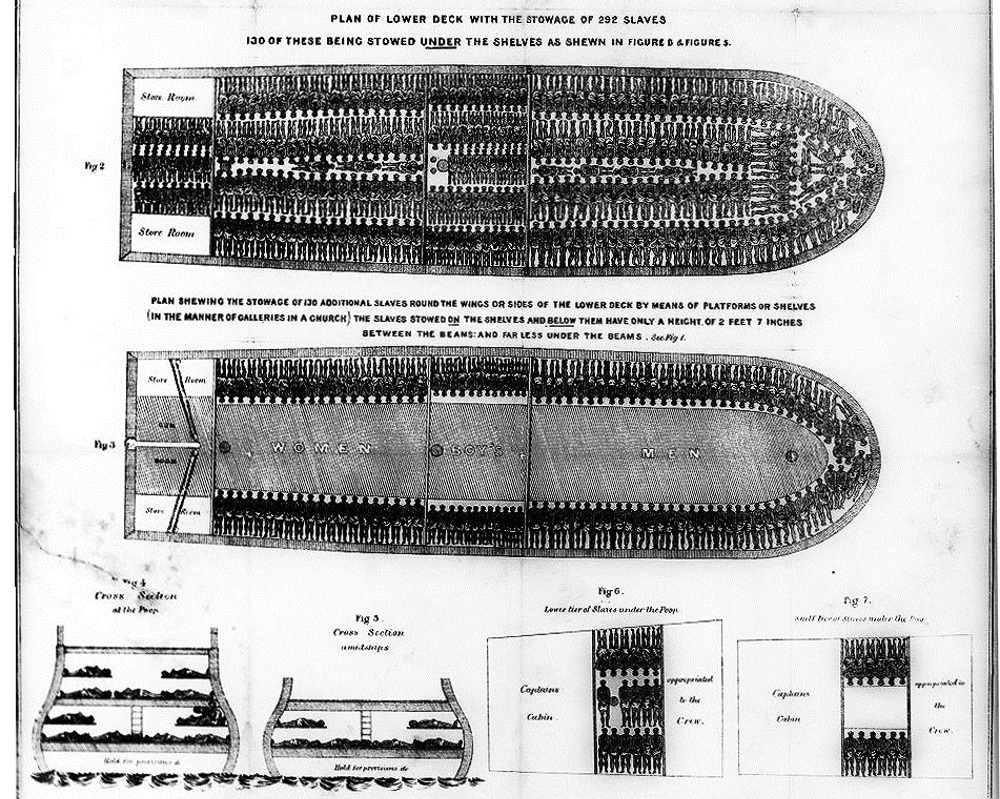American History | Modul 13 | Verstehen und urteilen | Brutalität und Menschenrechtsverletzung | ◻◻ mittel | ca. 30 min
 Plan des britischen Sklavenschiffs Brooke von 1788 | Vollständiges Bild und Bildnachweis (Public Domain, Wikimedia): Bild anklicken
Plan des britischen Sklavenschiffs Brooke von 1788 | Vollständiges Bild und Bildnachweis (Public Domain, Wikimedia): Bild anklicken
segu-Module zum Thema Kolonialgeschichte Alte Welt trifft neue Welt Spanische Eroberungen Streit um Kolumbus Trails of tears Atlantic slave trade Imperialismus – Kolonialismus – Rassismus Völkermord an den Herero
Beginning from the discovery of America by Christopher Columbus in 1492, the European powers colonised America and wiped out most of the original inhabitants, for example, the Aztecs, the Incas, and the Native Americans. As a result, there were not enough workers on the continent from the 16th century onwards, especially to work on the coffee, tobacco and cotton plantations in South America, the Caribbean and the southern part of what is now the United States. This shortage of labour led to the Atlantic slave trade. More than ten million Africans were brought to the American continent this way.
Aufgaben
InfoAbraham Lincoln’s position on slavery is one of the central issues in American history. Lincoln often expressed moral opposition to slavery in public and in private. In the 1850s, Lincoln was politically attacked as an abolitionist (someone who demands the abolition of slavery), but he did not consider himself one. Until his early presidency, Lincoln’s goal was to stop slavery from expanding, to ultimately bring it to an end. He did not call for the immediate end of slavery everywhere in the U.S. until the 1864 election.
The following phrases might help youStating an opinion: I would say … / In my opinion … / I strongly believe … / As far as I can see … / It is important to … agree: Yes, that is a good point. /I absolutely agree. / Exactly. /You are right about that. / That is just what I think, too. disagree: I would not say so. / Well, I do not think so. / I am afraid I don’t agree with you there. / I strongly disagree. partly agree: That might be true but …. / I’m not sure about this. / I see your point, but I think … / I can understand why … but … clarify: What I mean is … / Let me put it this way: … / Do you mean that…? / I’m not sure what you mean / What I am trying to say is …
To start your conversation, the following arguments may help youFarmer Illinois
Former Slave
Farmer Mississippi
|
Stichworte zum Modul Atlantic Slave Trade | Geschichte | Geschichtsunterricht | Unterricht | Amrican History | USA| Video | Sklaverei | Dreieckshandel
| Die Antworten zu den Aufgaben kannst du entweder in deine Geschichtsmappe schreiben – ganz einfach mit Stift und Papier. Du kannst die Antworten aber auch in die Textfelder unter den Aufgaben eingeben und anschließend ausdrucken oder als pdf abspeichern. Klicke dafür auf das Drucker-Symbol. Hier erhältst du weitere Informationen. |
